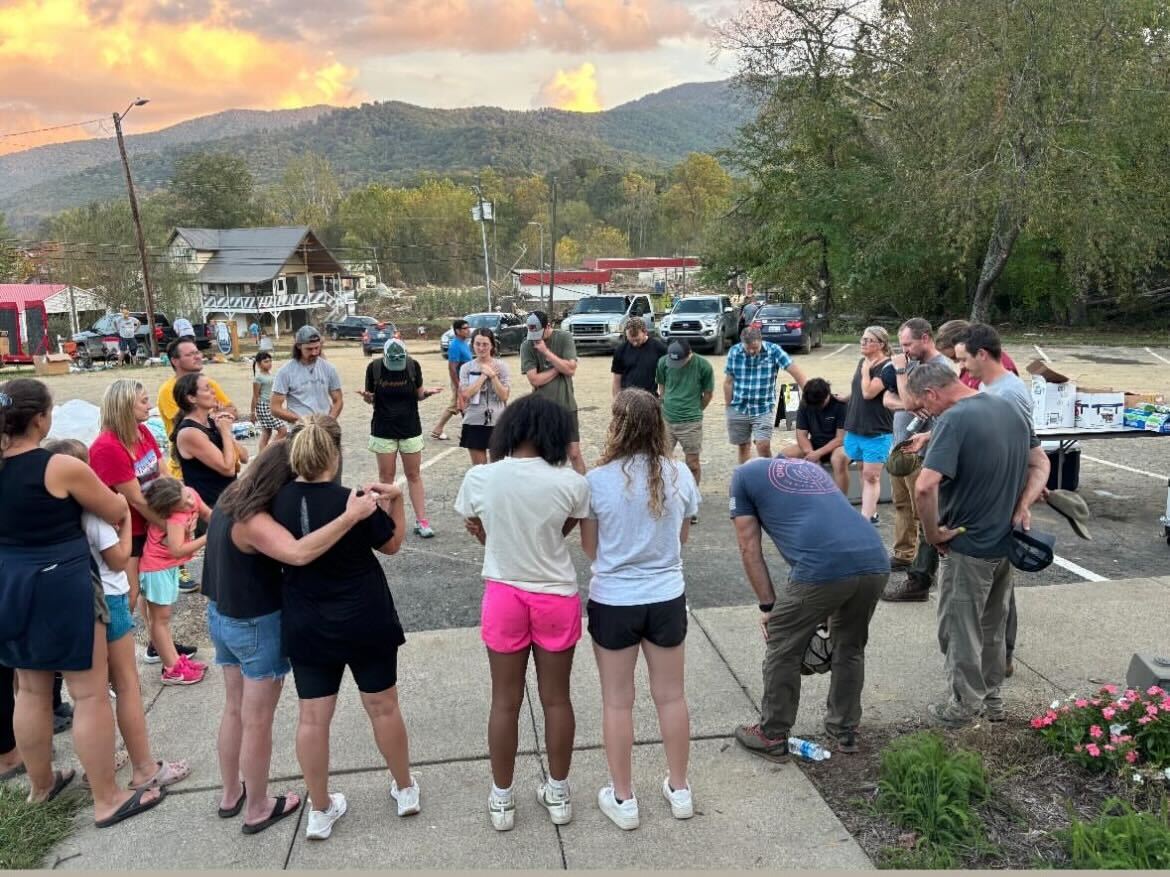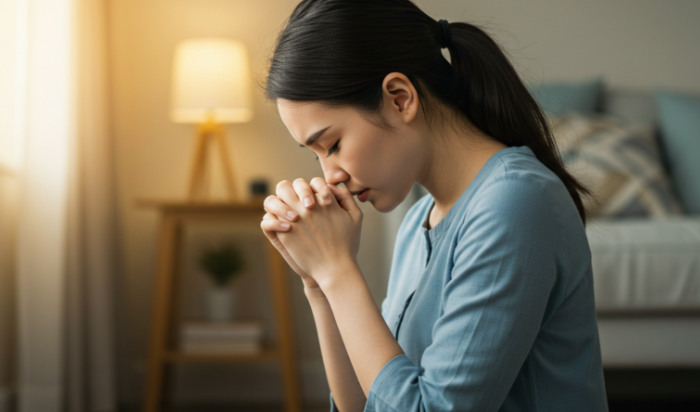How to Build Resilience Against Stress and Hardship (And What Hurricane Helene Taught Me)
How do we build resilience in the face of life’s challenges?
As a resident of Western North Carolina living in the wake of Hurricane Helene, resilience is a buzzword that has taken on a whole new meaning. I sit here a few weeks after the storm while schools are still closed and roads are washed away.
So many in my area are experiencing hardship – grieving the loss of a loved one, the loss of a job, the loss of a home, or even just the loss of a sense of normal.
As the world tries to make sense of what is happening here in my hometown, I keep seeing phrases like “strong” and “resilient.” But what do these words mean? How do we build resilience and how can yoga for resilience help?
What Does Resilience Mean?
Resilience is the ability to withstand adversity, recover from setbacks, and flourish even in the face of life’s challenges. While resilience is often associated with toughness and durability, it means much more than that.
At its heart, resilience is about the capacity to navigate challenges while maintaining your mental, emotional, and physical well-being. It’s not about avoiding hard things, but rather about facing them head-on. Resilience helps you navigate hardship and emerge from the situation even stronger.
People who are considered “resilient” possess key characteristics such as adaptability, emotional strength, problem-solving skills, persistence, a positive mindset, and a teachable heart.
In essence, resilience is the ability to bounce back, grow, and even thrive amidst life’s challenges. I have been amazed at how the people of my community here in Western North Carolina have been able to do just this! I have heard story after story of how folks have endured, both individually and collectively.
This storm has proven that resilience is a quality that can be cultivated and strengthened over time. Growing in resilience requires self-awareness, mindfulness, and a willingness to embrace life’s challenges alongside each other.
The Four Types of Resilience
Researchers have identified various types of resilience, each addressing a different aspect of how individuals and communities can withstand and recover from challenges. Together, they form a comprehensive framework for understanding how we can adapt and thrive in the face of adversity.
The four types of resilience are emotional resilience, mental resilience, physical resilience, and social resilience.
These four types of resilience are interconnected, and we often exhibit varying degrees of each type. Developing resilience in all these dimensions can lead to a better ability to cope with life’s challenges and thrive in the face of adversity.
Cultivating resilience is an ongoing process that involves self-awareness, skill-building, and a willingness to adapt and learn from difficult experiences. Ultimately, these skills will contribute to a more balanced and fulfilling life.
How to Build Emotional Resilience
What is emotional resilience? This type of resilience relates to your ability to manage and bounce back from emotional challenges. Emotionally resilient people navigate stress, grief, and disappointment while maintaining emotional stability.
They are skilled at coping with negative feelings and finding ways to restore emotional well-being. Building emotional resilience is a valuable skill that empowers you to navigate the emotions that come with challenges.
A few strategies to help cultivate emotional resilience include:
- Cultivating self-awareness by seeking to understand your emotions and recognize their triggers.
- Learn techniques for managing your emotions, such as deep breathing, mindfulness, or meditation. These practices can help you remain calm in stressful situations and prevent emotional overwhelm.
I definitely have found these strategies for building emotional resilience effective while navigating the myriad of emotions that I have experienced during Hurricane Helene.
Grounding rituals from my yoga practice and regular emotional “check-ins” on my heart help me become aware of my feelings. These practices help me to move through powerful feelings like fear, sadness, and anxiousness with steadiness and ease.
Building emotional resilience is an ongoing process that requires practice and patience. By implementing these strategies, you can develop the emotional strength to handle life’s challenges more effectively. You will bounce back from setbacks and foster a greater sense of well-being and contentment.
How to Build Mental Resilience
What is mental resilience? Mental resilience centers on cognitive abilities and thought processes. It involves adaptive thinking, problem-solving skills, and the capacity to maintain mental clarity and focus under pressure.
When you’re mentally resilient, you can reframe negative situations into opportunities for growth. You maintain a positive outlook and persevere through mental challenges like self-doubt or uncertainty. Building mental resilience is essential for navigating life’s challenges with clarity and confidence.
Here are some strategies to help strengthen your mental resilience:
- Maintain a growth mindset & foster positive thinking by challenging negative thoughts and replacing them with more constructive and optimistic ones. Embrace challenges as opportunities for growth.
- Practice cognitive flexibility by training your mind to adapt to changing situations, see problems from different angles, and consider alternative solutions.
- Develop problem-solving skills by analyzing challenges objectively, breaking them down into manageable steps, and working toward solutions.
Scriptures for Mental Resilience
Refreshing and renewing my mind in Scripture helps me build mental resilience. It trains my eyes to see how God is working and allows me to move through challenges like Hurricane Helene with peace and ease.
Meditating on Jesus’ words from John 16:33 reminds me that difficulties in this life are to be expected. “In this world, you will have trouble. But take heart! I have overcome the world.”
Jesus has conquered evil and “overcome the world,” which gives me hope and fights back waves of despair.
I also cling to the hope of Romans 8:28: “In all things, God works for the good of those who love him, who have been called according to his purpose.”
Building mental resilience is an ongoing process that requires practice and self-awareness. By implementing these strategies, you can lift your eyes to the things above. Meditating on Scripture helps you remember God’s promises and strengthen your mental fortitude. It will also enhance your ability to handle stress and develop a more positive and adaptable mindset for facing life’s challenges.
How to Build Physical Resilience
What is physical resilience? Physical resilience pertains to your ability to withstand and recover from physical stressors and/or illnesses. Physically resilient people have robust immune systems, strong bodies, and good stamina. Their physical resilience enables them to bounce back from physical setbacks and maintain vitality.
Building physical resilience involves strengthening your body’s ability to withstand and recover from physical stressors.
Some strategies to help you build physical resilience include:
- Regular exercise improves physical strength but also boosts immunity and reduces the risk of chronic illnesses.
- Staying hydrated and eating a nutrient-rich diet nourishes your body.
- Prioritizing quality sleep allows your body to rest, repair, and regenerate. Aim for 7-9 hours of uninterrupted sleep each night.
I have definitely benefited from these strategies that helped me to build physical resilience before the hurricane. Strength training and regular exercise helped me to develop the muscles and stamina required for clearing debris and hauling water to drink, wash, and flush toilets!
Staying hydrated helps to ward off sickness and quality sleep has been a pleasant by-product of our early bedtime due to having no electricity!
Building physical resilience is a lifelong endeavor. By adopting strategies like these, you can enhance your body’s ability to withstand physical challenges, recover more effectively, and maintain optimal well-being throughout your life.
How to Build Social Resilience
What is social resilience? Social resilience includes your capacity to maintain and nurture positive relationships and support systems. It involves effective communication, empathy, and the ability to seek and offer social support.
Socially resilient people can lean on their social networks during challenging times and contribute to the well-being of others, fostering a sense of belonging and community. Building social resilience involves developing the skills and support networks necessary to navigate social challenges, maintain healthy relationships, and thrive in various social contexts.
Some strategies to help you build social resilience include:
- Develop effective communication skills by actively listening, expressing your thoughts and feelings clearly, and practicing empathy.
- Learn to set and maintain healthy boundaries in your relationships to ensure that your emotional and mental well-being is respected.
- Learn to address conflicts constructively. Seek solutions that promote mutual understanding and compromise, rather than escalating disputes.
How My Community Has Come Together and Shown Social Resilience in the Aftermath of Helene
If I were to summarize my experience of Hurricane Helene and what I would like to carry with me after this storm, it is the power of community.
I am proud to have lived in Western North Carolina for almost 27 years. I have invested plenty of time and energy in cultivating strong social networks with my neighbors, in my faith family, and in the greater communities of Black Mountain and Swannanoa, NC.
Hurricane Helene has revealed the compassion of neighbors who are eager to share their water, fuel, and food, and to meet up to swap stories on the street.
Relationships that have been tried and tested over time in my faith family have produced the collective vision, communication, and direction necessary to allow us to offer basic supplies, water, showers, and warm meals each day to our community.
In our small town, I have been humbled to witness so many different churches in this area linking arms with each other and with local agencies to literally be “the hands and feet of Jesus”.
I am grateful to be a part of my small mountain community and proud of the way that we have all come together to support each other through this storm. We quite literally are “better together”.
Building this kind of social resilience involves an investment of time, energy, humility, ongoing self-awareness, and the development of interpersonal skills. These strategies and a whole lot of grace can help you navigate social challenges, build positive relationships, and foster a supportive social network that contributes to your overall well-being.
Practicing Yoga for Resilience
Practicing yoga is a powerful tool for building resilience, as it nurtures physical, mental, and emotional strength while promoting a balanced and adaptable mindset.
The postural practices of yoga (asanas) build strength and flexibility which produces a stronger physical body that is more resilient to fatigue, pain, and recovery from illness or injury.
Holding challenging postures during a yoga practice teaches endurance, patience, and the ability to stay calm and present in discomfort. Yoga fosters physical and mental resilience that can be applied to everyday struggles.
The breathwork practices of yoga (pranayama) such as deep breathing, alternate nostril breathing, and diaphragmatic breathing calm the nervous system. They reduce anxiety, help manage stress, and provide mental clarity, allowing you to remain calm and composed during challenges.
Breathwork practices help build resilience by increasing focus and concentration, promoting mindfulness and emotional control. This supports better decision-making and clearer thinking during tough situations.
The meditation and mindfulness practices of yoga (samyama) encourage self-awareness, which helps you build emotional resilience by recognizing and processing your emotions rather than being overwhelmed by them.
By training the mind to remain calm and centered, meditation and yoga enhance mental resilience and allow you to face challenges with greater equanimity and reduce the impact of external stressors.
Through these practices, yoga creates a holistic approach to building resilience, preparing you to face life’s ups and downs with greater strength, balance, and adaptability.
A Heartfelt Thank You
Thank each and every one of you for checking in and for praying for me and my family during Hurricane Helene. While the storm is gone, the recovery here in WNC is far from over. We have a long way to go.
I am blessed that my practice of yoga has taught me many of these strategies for building resilience. I look forward to seeing how God allows me to use these skills to build resilience to help others navigate the aftermath of Hurricane Helene and other challenges.
Join Me in Costa Rica for the Body & Soul Retreat
Want to dive deeper into how to build resilience? We will explore how yoga can help Christians build resilience and live an abundant life in Christ in my upcoming retreat this February in Costa Rica. Get the details here.

Grow in Godly wisdom and wonder…
From Bible studies and book clubs to rich topics like Christ-centered yoga, meditation, energy work, prayer practices, and more—our studies are designed to deepen your faith, broaden your understanding, and nurture your soul.
Join the waitlist for exclusive discounts and to be the first to know when our next study opens!






